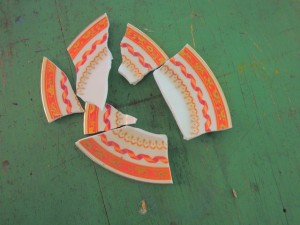 When my grandmother passed, she left me a silver tea service, a flight of crystal glasses, and a set of fine china. Preserved in her display cabinet and brought out twice a year for Christmas and Thanksgiving, they were curated with the greatest care. Now they were in boxes on my kitchen floor. How this fragile-boned finery would ever fit into my rough-and-tumble lifestyle was a mystery.
When my grandmother passed, she left me a silver tea service, a flight of crystal glasses, and a set of fine china. Preserved in her display cabinet and brought out twice a year for Christmas and Thanksgiving, they were curated with the greatest care. Now they were in boxes on my kitchen floor. How this fragile-boned finery would ever fit into my rough-and-tumble lifestyle was a mystery.
I unpacked each item from its bubble wrap and parchment and placed them on my counter. Unmarried, unconventional—a “free spirit,”– I simply didn’t host the kind of Special Occasions that warranted gilded saucers, delicate sorbet cups, and stainless pitchers. Or to rephrase that: nearly every evening felt like a special occasion—my house a procession of spontaneous music jams, impromptu dinners, and travelers. But the bunch I consorted with were unwieldy, folks-on-the-fly and wild spirits–a charismatic set to be sure– not the refined raised-pinky chit-chatters my grandmother kept stead company with.
And so as I arranged each of my grandmother’s plates and crystal goblets along the kitchen shelves of my ramshackle cottage, a dissonance set in. In the commingling of our kitchenware, I could see our mismatched personalities: Her silver spoons clashed with my tin blue camping plates, my sturdy masons sidled strangely with her delicate sorbets, and her thin-as-air wine glasses stood in contrast to my hand-spun coffee mugs all crazily Pollock-ed with glaze. In then end, dinner at my table would be a curious remix of era and lifestyle–‘Hillbilly chic’ I dubbed it, and proceeded to use her wares with confidence: If I knew if I didn’t use them now, I would never use them.
But it was a risk, I learned quickly, as one by one the glasses began to break—a crystal goblet upturned by Jeanine’s elbow in an animated Scrabble game, another sat on by Ron during an after-dark BBQ. A few plates fell off the shelf one midnight—a ghost perhaps?–and another was sent flying when a bulldog dashed under the table. Once, mowing the lawn, I discovered a silver spoon that a guest inadvertently dropped while bringing their plate in from a midday picnic.
I have felt guilty at times: when in the middle of a music jam I fell in love with the chiming resonance of spoon-on-crystal-glass and was suddenly ashamed: What would my grandmother make of this? I remembered their precious placement along the dust-free shelves of her china cabinet, but then resumed my heirloom percussion: It may have been irreverent, I told myself, but I was certainly enjoying them more than my grandmother ever did.
But it was one guest in particular that settled my conscience on it finally. Thomas and his wife Mary showed up from Sonoma with guitars and a large musical repertoire. We ate dinner and sang Bob Dylan and as the porcelain plate of the moon rose over the mountain, I sipped Merlot from a goblet and told him of my conflict about using my family heirlooms so casually.
Thomas replied with a story about the Oakland fires back in 1991–a disaster that left almost 4,000 homes destroyed in its wake. A memorial wall now stands as a reminder of the temporality of life and of material goods and as an encouragement not to put things off: Use your fine china, it instructs.
Two weeks later Thomas died unexpectedly, making this story now indelible in my mind.
I continue to use my grandmother’s dishes, but am trying to be more careful. My devil-may-care attitude is being replaced with something more gingerly: I’m newly aware that each one is as irreplaceable as Thomas who filled the warm air with music on that singular summer night. Every broken dish is a small stab, a piece of my grandmother, of my family history gone. At the shatter-sound of each loss, I let a sharp breath out and take the lesson: Let-it-go. I know it is inevitable: that someday they will all be gone if not in my generation, than the next or the next.
